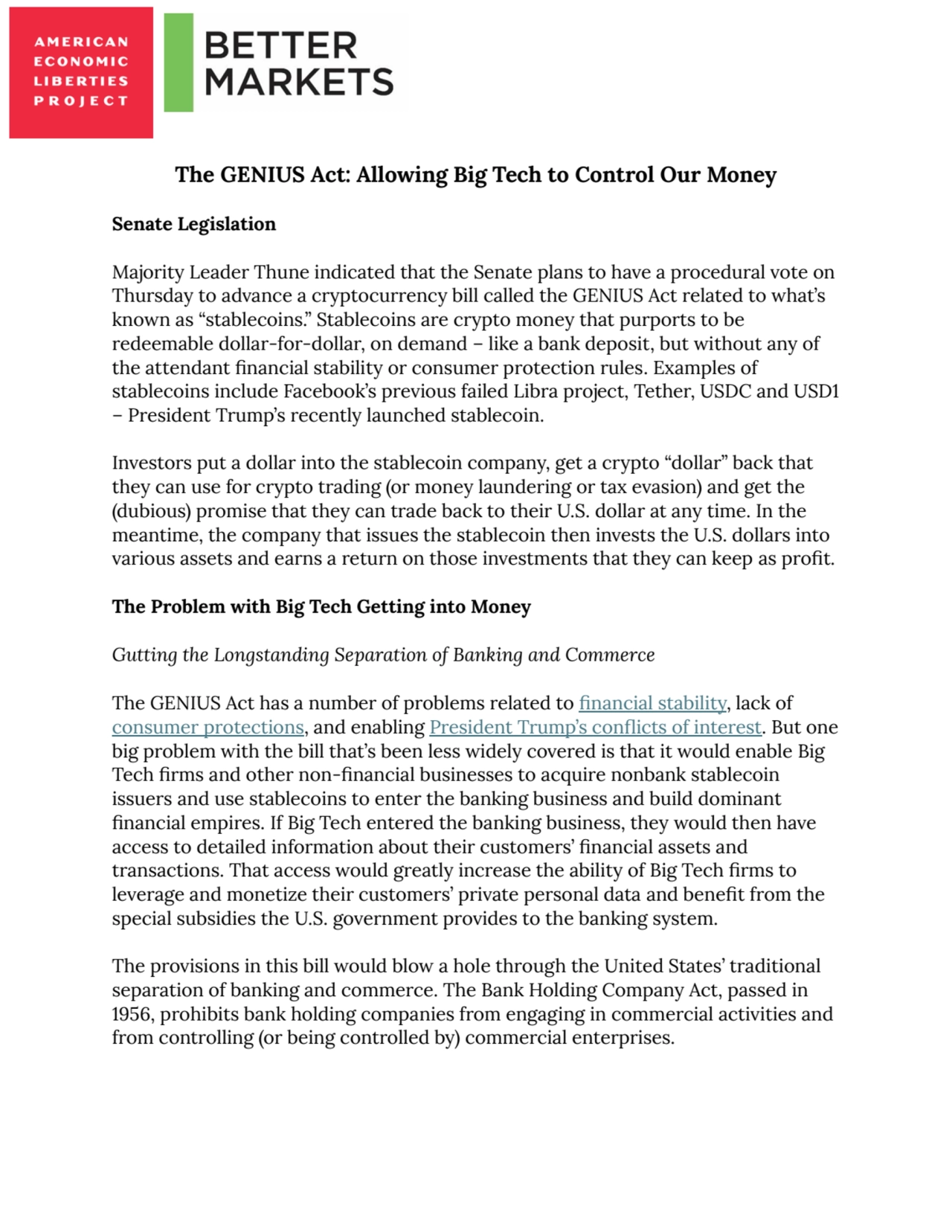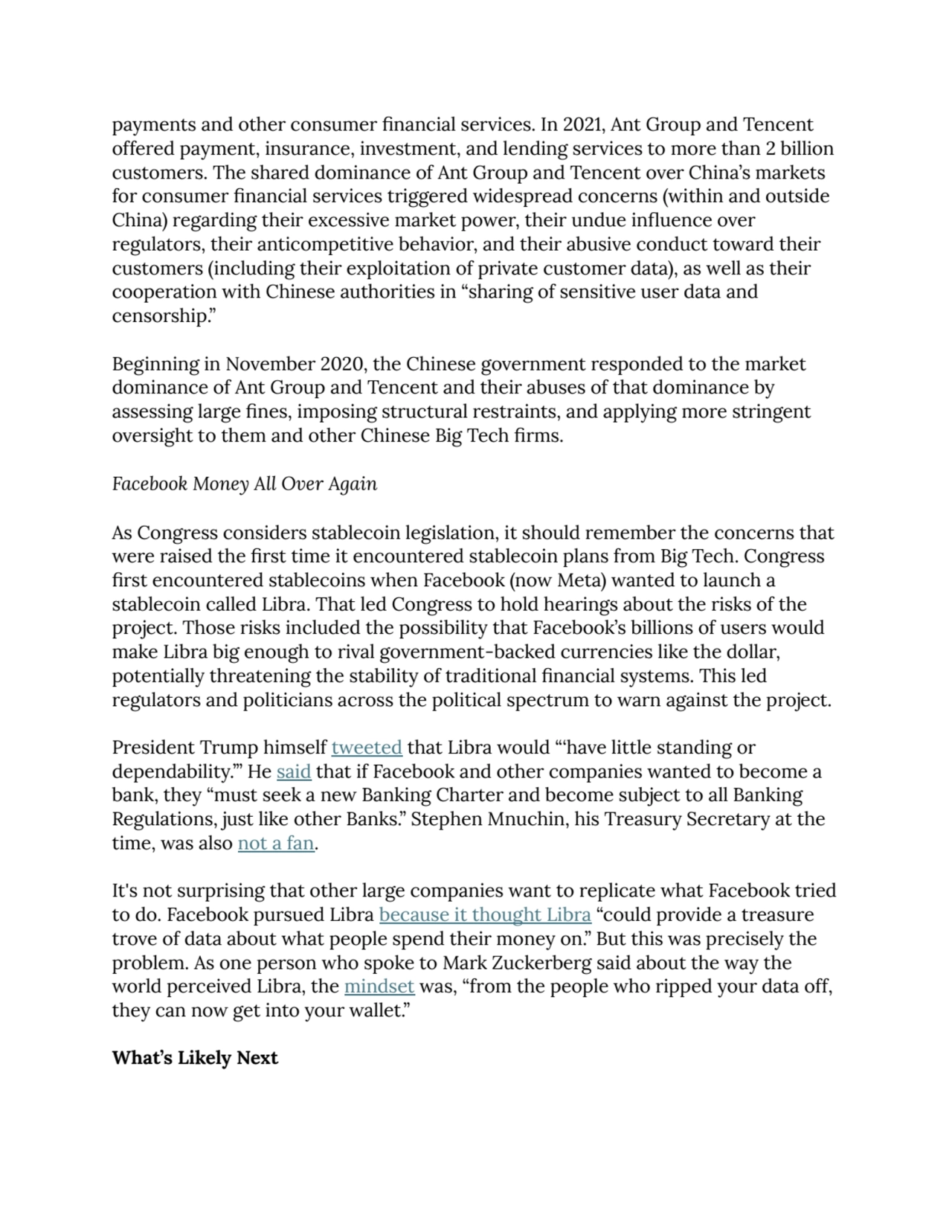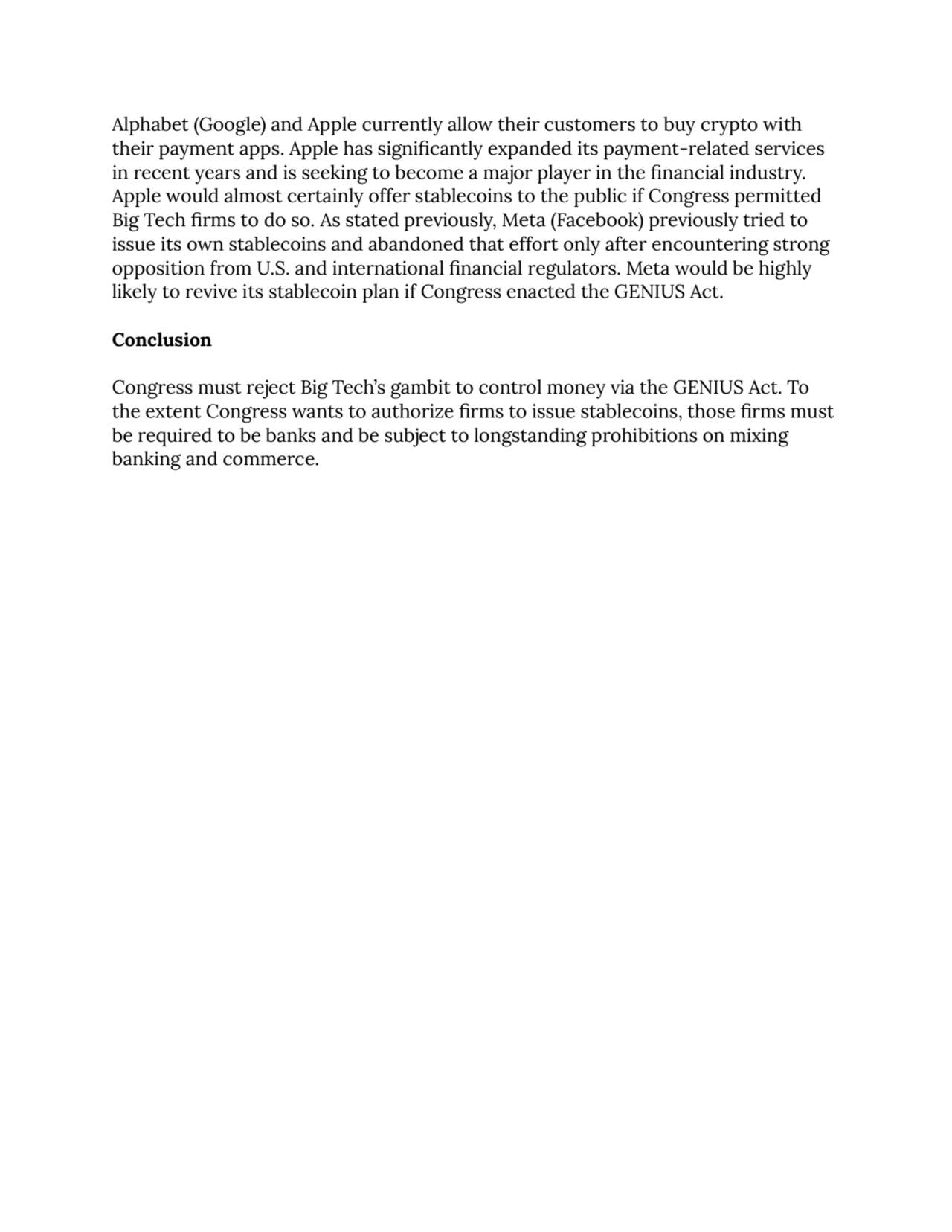Understanding the GENIUS Act's Implications
 AI Summary
AI Summary
Key Insights
- 💰 GENIUS Act Concerns: The GENIUS Act raises concerns about financial stability and consumer protection due to stablecoin regulation.
- 🏦 Big Tech's Banking Ambitions: The act could enable Big Tech firms to enter the banking sector, potentially leading to financial dominance.
- 🕵️♂️ Privacy and Data Risks: Allowing Big Tech to issue stablecoins raises concerns about surveillance, data monetization, and privacy breaches.
- 🇨🇳 Importing Chinese Model: The document warns against replicating China's model, where tech giants dominate financial services with lenient policies.
- ⚖️ Congressional Action: Congress should reject Big Tech's attempt to control money via the GENIUS Act and regulate stablecoin issuers as banks.
Loading...

Loading...
![This longstanding policy is specifically designed to prevent the dangers associated
with banking-and-commercial conglomerates, including (i) excessive
concentrations of financial and economic power and political influence; (ii)
conflicts of interest that would compromise the ability of banks to act as objective
providers of credit and other financial services; and (iii) heightened risks of
contagion between the financial and commercial sectors of our economy, greatly
increasing the likelihood of systemic crises that would require huge bailouts to
avoid devastating financial, economic, and social consequences.
The Banking Holding Company Act also prevents commercial firms from obtaining
unfair advantages over their nonbank competitors by exploiting the federal “safety
net” for banks such as Deposit Insurance, the Fed’s discount window for banks, the
Fed’s emergency lending programs, and the Fed’s payment system guarantees
(including guarantees for payments made on Fedwire and FedNow). Congress has
consistently recognized that Big Tech firms and other commercial enterprises
should not benefit from the backstop provided to the tightly-regulated banking
system.
Surveillance and Privacy Concerns
Big Tech entering the banking business also has worrying implications for
surveillance and privacy. Former CFPB Director Rohit Chopra warned that Big Tech
firms would “have a strong incentive to surveil all aspects of a consumer’s
transactions, since this data can advantage the rest of their businesses,” and such
“corporate surveillance activities can also raise a range of questions about
espionage, tracking, and censorship.”
Allowing Big Tech firms to issue or distribute stablecoins would, according to one
expert, enable them “to collect and monetize a vast array of data about [their]
customers’ financial assets and transactions.” That data collection “would increase
exponentially their existing ability to leverage and monetize their customers’
personal information and to compromise their customers’ privacy by secretly
transferring that information to third party sellers of goods and services” and by
cross-selling their own goods and services.
Importing the Chinese Model
Director Chopra’s 2023 speech and a CFPB report issued in 2022 highlighted the
dramatic growth of China’s two leading Big Tech firms – Ant Group/Alipay and
Tencent/WeChat Pay – during the preceding fifteen years. China’s government
adopted lenient policies that facilitated the rapid growth of Ant Group and Tencent
after 2008, and those firms became dominant players in China’s markets for mobile](https://d2z384uprhdr6y.cloudfront.net/P82fR46C8_secsA9AGCfNRcGG2q71VCgRLznJODR3KY/rt:fill/q:100/w:1280/h:0/gravity:sm/czM6Ly9qYXVudC1wcm9kdWN0aW9uLXVwbG9hZHMvMjAyNS8wNy8yNi9hMzExNGQ1ZS1mOTYzLTRjMjYtOWQ5ZS1kMThhZmE5YzVjZDkvc2xpZGVfMi1sLndlYnA=.webp)
Loading...

Loading...

Understanding the GENIUS Act's Implications
- 1. The GENIUS Act: Allowing Big Tech to Control Our Money Senate Legislation Majority Leader Thune indicated that the Senate plans to have a procedural vote on Thursday to advance a cryptocurrency bill called the GENIUS Act related to what’s known as “stablecoins.” Stablecoins are crypto money that purports to be redeemable dollar-for-dollar, on demand – like a bank deposit, but without any of the attendant financial stability or consumer protection rules. Examples of stablecoins include Facebook’s previous failed Libra project, Tether, USDC and USD1 – President Trump’s recently launched stablecoin. Investors put a dollar into the stablecoin company, get a crypto “dollar” back that they can use for crypto trading (or money laundering or tax evasion) and get the (dubious) promise that they can trade back to their U.S. dollar at any time. In the meantime, the company that issues the stablecoin then invests the U.S. dollars into various assets and earns a return on those investments that they can keep as profit. The Problem with Big Tech Getting into Money Gutting the Longstanding Separation of Banking and Commerce The GENIUS Act has a number of problems related to financial stability, lack of consumer protections, and enabling President Trump’s conflicts of interest. But one big problem with the bill that’s been less widely covered is that it would enable Big Tech firms and other non-financial businesses to acquire nonbank stablecoin issuers and use stablecoins to enter the banking business and build dominant financial empires. If Big Tech entered the banking business, they would then have access to detailed information about their customers’ financial assets and transactions. That access would greatly increase the ability of Big Tech firms to leverage and monetize their customers’ private personal data and benefit from the special subsidies the U.S. government provides to the banking system. The provisions in this bill would blow a hole through the United States’ traditional separation of banking and commerce. The Bank Holding Company Act, passed in 1956, prohibits bank holding companies from engaging in commercial activities and from controlling (or being controlled by) commercial enterprises.
- 2. This longstanding policy is specifically designed to prevent the dangers associated with banking-and-commercial conglomerates, including (i) excessive concentrations of financial and economic power and political influence; (ii) conflicts of interest that would compromise the ability of banks to act as objective providers of credit and other financial services; and (iii) heightened risks of contagion between the financial and commercial sectors of our economy, greatly increasing the likelihood of systemic crises that would require huge bailouts to avoid devastating financial, economic, and social consequences. The Banking Holding Company Act also prevents commercial firms from obtaining unfair advantages over their nonbank competitors by exploiting the federal “safety net” for banks such as Deposit Insurance, the Fed’s discount window for banks, the Fed’s emergency lending programs, and the Fed’s payment system guarantees (including guarantees for payments made on Fedwire and FedNow). Congress has consistently recognized that Big Tech firms and other commercial enterprises should not benefit from the backstop provided to the tightly-regulated banking system. Surveillance and Privacy Concerns Big Tech entering the banking business also has worrying implications for surveillance and privacy. Former CFPB Director Rohit Chopra warned that Big Tech firms would “have a strong incentive to surveil all aspects of a consumer’s transactions, since this data can advantage the rest of their businesses,” and such “corporate surveillance activities can also raise a range of questions about espionage, tracking, and censorship.” Allowing Big Tech firms to issue or distribute stablecoins would, according to one expert, enable them “to collect and monetize a vast array of data about [their] customers’ financial assets and transactions.” That data collection “would increase exponentially their existing ability to leverage and monetize their customers’ personal information and to compromise their customers’ privacy by secretly transferring that information to third party sellers of goods and services” and by cross-selling their own goods and services. Importing the Chinese Model Director Chopra’s 2023 speech and a CFPB report issued in 2022 highlighted the dramatic growth of China’s two leading Big Tech firms – Ant Group/Alipay and Tencent/WeChat Pay – during the preceding fifteen years. China’s government adopted lenient policies that facilitated the rapid growth of Ant Group and Tencent after 2008, and those firms became dominant players in China’s markets for mobile
- 3. payments and other consumer financial services. In 2021, Ant Group and Tencent offered payment, insurance, investment, and lending services to more than 2 billion customers. The shared dominance of Ant Group and Tencent over China’s markets for consumer financial services triggered widespread concerns (within and outside China) regarding their excessive market power, their undue influence over regulators, their anticompetitive behavior, and their abusive conduct toward their customers (including their exploitation of private customer data), as well as their cooperation with Chinese authorities in “sharing of sensitive user data and censorship.” Beginning in November 2020, the Chinese government responded to the market dominance of Ant Group and Tencent and their abuses of that dominance by assessing large fines, imposing structural restraints, and applying more stringent oversight to them and other Chinese Big Tech firms. Facebook Money All Over Again As Congress considers stablecoin legislation, it should remember the concerns that were raised the first time it encountered stablecoin plans from Big Tech. Congress first encountered stablecoins when Facebook (now Meta) wanted to launch a stablecoin called Libra. That led Congress to hold hearings about the risks of the project. Those risks included the possibility that Facebook’s billions of users would make Libra big enough to rival government-backed currencies like the dollar, potentially threatening the stability of traditional financial systems. This led regulators and politicians across the political spectrum to warn against the project. President Trump himself tweeted that Libra would “‘have little standing or dependability.’” He said that if Facebook and other companies wanted to become a bank, they “must seek a new Banking Charter and become subject to all Banking Regulations, just like other Banks.” Stephen Mnuchin, his Treasury Secretary at the time, was also not a fan. It's not surprising that other large companies want to replicate what Facebook tried to do. Facebook pursued Libra because it thought Libra “could provide a treasure trove of data about what people spend their money on.” But this was precisely the problem. As one person who spoke to Mark Zuckerberg said about the way the world perceived Libra, the mindset was, “from the people who ripped your data off, they can now get into your wallet.” What’s Likely Next
- 4. Alphabet (Google) and Apple currently allow their customers to buy crypto with their payment apps. Apple has significantly expanded its payment-related services in recent years and is seeking to become a major player in the financial industry. Apple would almost certainly offer stablecoins to the public if Congress permitted Big Tech firms to do so. As stated previously, Meta (Facebook) previously tried to issue its own stablecoins and abandoned that effort only after encountering strong opposition from U.S. and international financial regulators. Meta would be highly likely to revive its stablecoin plan if Congress enacted the GENIUS Act. Conclusion Congress must reject Big Tech’s gambit to control money via the GENIUS Act. To the extent Congress wants to authorize firms to issue stablecoins, those firms must be required to be banks and be subject to longstanding prohibitions on mixing banking and commerce.